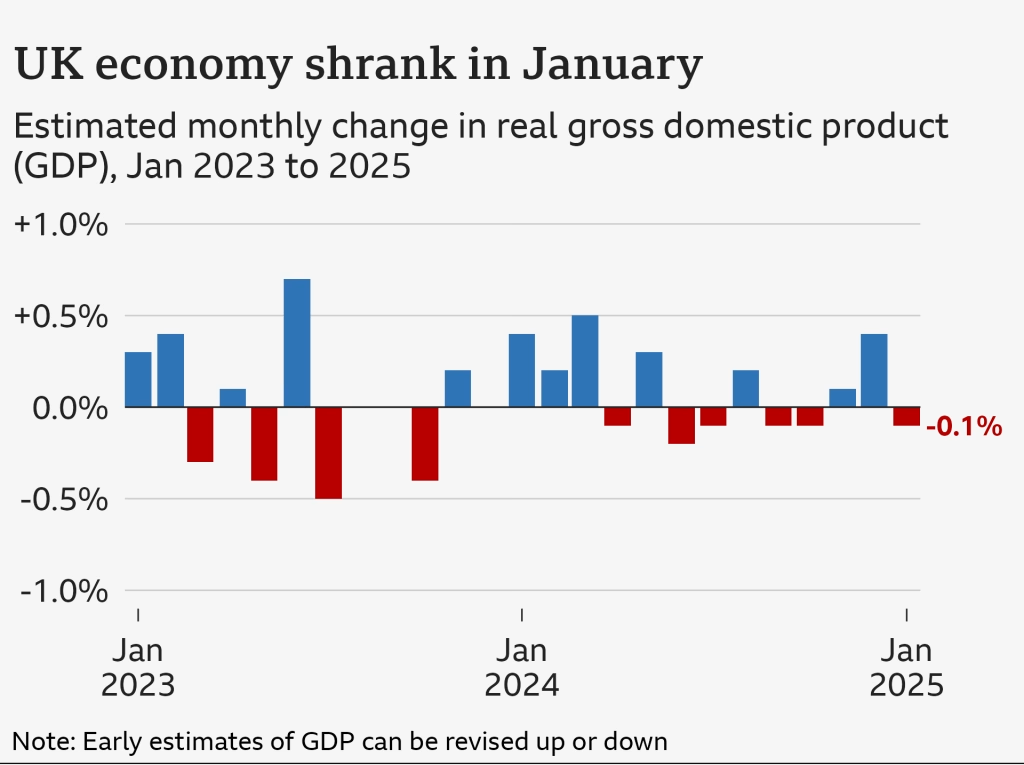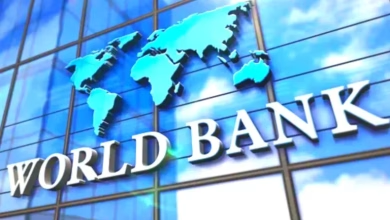The UK economy shrank more than expected in January

- Small businesses worry about higher costs
- The UK economy dropped by 0.1% in January
- The economy's decline may affect tax and spending
The UK economy unexpectedly shrank in January, causing a setback for the government ahead of its Spring Statement later this month.
The economy fell by 0.1%, worse than expected, mainly due to a downturn in the manufacturing sector.
The government has prioritized boosting economic growth, but a weaker economy might impact Chancellor Rachel Reeves’ decisions, as she tries to follow her self-imposed rules on taxes and spending.
Reeves admitted the need for the government to act “more quickly and decisively” on the economy, but the Conservatives criticized it, calling it a “growth killer.” Economists had expected a 0.1% growth in January after a 0.4% rise in December. While monthly numbers can be unpredictable, the ONS reported a 0.2% growth over the three months leading to January.
However, Liz McKeown, the ONS director of economic statistics, said the overall economic picture for the UK was one of weak growth.
The construction and oil and gas sectors struggled, while retail, particularly food stores, saw an uptick as more people ate and drank at home.

With tax increases set for April, concerns remain that economic growth will remain sluggish.
Businesses have warned that higher National Insurance contributions, increased minimum wages, and reduced business rate relief could slow economic growth, as employers may have less money for pay raises and hiring new employees.
Furthermore, businesses face uncertainty due to US President Donald Trump’s tariffs, and the government is under pressure to boost defense spending.
In response to the growth figures, Reeves stated, “The world has changed, and we are feeling the global impact.”
She mentioned the government is implementing the “largest sustained increase in defense spending since the Cold War,” but public spending plans are under pressure as the Chancellor works to meet her tax and spending rules.
Last month, the Bank of England lowered its growth forecast for the UK this year, and the Office for Budget Responsibility is likely to revise its forecast further during the Spring Statement.
This has led to expectations that the government will need to cut spending to meet fiscal targets.
Next week, the government is expected to announce significant cuts to welfare as part of these savings. Conservative shadow chancellor Mel Stride criticized the Labour government, calling it a “growth killer” due to tax hikes and restrictive employment laws.
Daisy Cooper, the Lib Dem Treasury spokeswoman, said Reeves’ growth plan leaves the economy “on life support,” with tax changes likely to hurt small businesses. John Dipre, a garden center owner in Surrey, said the changes to National Insurance, less help with rates, and a higher minimum wage would “hit us hard.”
“It’s going to be very tough,” he said. “If you truly want to support growth, support small businesses. That’s what England’s all about.” Yael Selfin, chief economist at KPMG UK, said predictions of “slow growth” mean Reeves will likely “tighten purse strings” in the Spring Statement.
The recent reduction in UK aid to fund increased defense spending “is a sign that some departments will face spending cuts,” she added.
Anna Leach, chief economist at the Institute of Directors, said that while a small rise or fall in GDP for one month isn’t significant, the key issue is that the economy overall is “weak and vulnerable.”
Car manufacturers, in particular, face “notable weaknesses” due to trade uncertainties caused by Trump’s tariffs and changes in the targets for electric vehicle adoption.
She stated that the UK’s growth figures “certainly won’t help” ahead of the Spring Statement.






